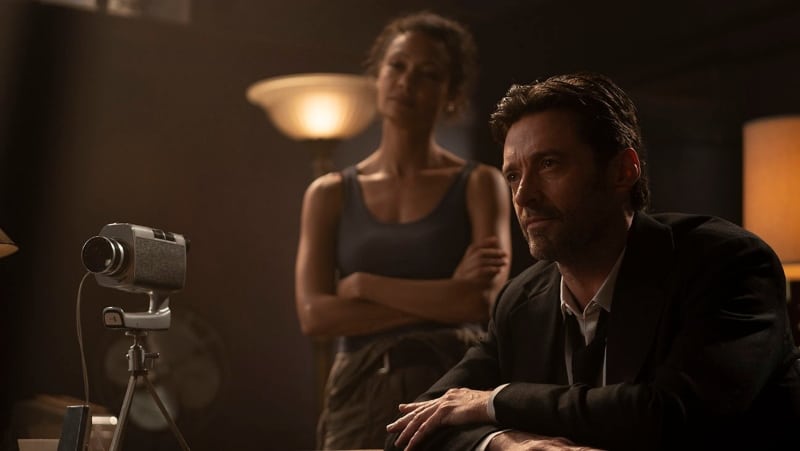Time marches ever onward, but movies continue finding ways to explore the past in ways we can’t match in the real world. From characters who literally travel through time to those who use technology to vicariously relive times gone by, science fiction films can capture our unending desire to look — and sometimes live — in the past. Lisa Joy, co-creator of Westworld, recognizes that obsession and has crafted her feature debut on the subject. But for a film about memory, Reminiscence might just leave you struggling to find much worth remembering.
Nick Bannister (Hugh Jackman) is a veteran of the border war who now makes his home in a waterlogged Miami. Rising waters and wealth disparity have left the city divided with lower class citizens surviving in a Venice-like metropolis while the wealthy live in dry, walled-in neighborhoods. He works alongside his friend and fellow vet, Watts (Thandiwe Newton), at a memory tank — clients immerse themselves into a tub, and with Nick’s guidance they get to relive specific memories. Nick and Watts can also see those same memories projected onto a circular stage, and the humdrum of it all takes a turn with the arrival of Mae (Rebecca Ferguson). She lost her keys, but when she disappears a short time later it’s Nick who’s lost something valuable, and he becomes obsessed with finding her again.
You’re going on a journey, a journey through memory. Your destination? Memories and reminders of better movies. Obsession (1976), Blade Runner (1982), Strange Days (1995), The Pledge (2001), Minority Report (2002)… Joy’s Reminiscence will have you thinking of these and more, and while homage isn’t a bad thing on its own it’s not meant to be a replacement for a film’s own identity. For all its visual wonder — and this is a gorgeous film with spectacular production design — neither the characters not their journey are all that engaging. The result is a film that meanders through familiar beats without ever finding its own voice.
On that point, Reminiscence‘s use of voiceover distracts more than helps. Nick’s narration suggests an intended noir-like atmosphere, but like too much of Joy’s dialogue it’s so preciously on the nose that it’s difficult to take seriously. He talks as if his search for Mae is big and important, but the time we actually spend with the couple amounts to so little that we don’t feel the same urgency. His limp is confused with a character trait, and she’s an empty vessel, a dream girl who finds a wide-eyed lap dog in Nick. Jackman at least gives it his all, but Ferguson is never able to find the character’s spark and exists solely as “an idea wrapped in a tight dress.” Nick’s obsession is immediate and one viewers won’t share, and that’s especially the case when glaringly obvious details are mentioned only to return later as “aha” moments. Viewers are too far ahead of Nick, and waiting for him to catch up is at times tiring.
Other characters are a mixed bag starting with Newton’s Watts. She’s far more interesting than Mae, both in her past and present, but she’s sidelined in favor of Nick’s bland pursuit. (Not for nothing, but the similarities here to Angela Bassett’s Mace from Strange Days are numerous.) She’s occasionally saddled with heavy exposition, but Newton gives it heart and loss that are absent from the leads. The supporting players include some familiar faces in Cliff Curtis and Angela Sarafyan, but it’s only Daniel Wu who fully recognizes he’s in a big slice of the fantastic and delivers his dialogue — “Vet, huh? You folks even starch your sentences.” — with a little bit of chaos that the rest of Reminiscence lacks.
The real highlights of Reminiscence are the visual effects and production design. From the overhead wide shots of a flooded Miami to street level sloshing and levees, you can’t help but buy into this physical world. Cinematographer Paul Cameron and designer Howard Cummings do strong work alongside Joy in crafting a near future landscape — after both an uncertain war and ongoing climate change — but the script isn’t able to match its creation. The script tosses in slight threads on class, race, and a fragile society, but it’s all window dressing on a main narrative focused exclusively on a dude obsessed with finding the girl who ghosted him.
Smaller issues arise within the film’s own logic, from some very large coincidences to things seen in the “memories” that were never seen by the host — meaning it can’t have been in their memory, no? — but they’d be forgivable if the film managed any sense of urgency or interest. Instead, those otherwise minor beats take on a bigger life as your mind wanders from the central narrative. The cohesive glue holding it all together comes down to the sensory elements including the visuals and Ramin Djawadi‘s excellent score. The latter in particular gives the film a livelier feel than it deserves.
Reminiscence isn’t a bad film — it’s far too beautiful to qualify as that — but its lack of an identity hangs heavy over every frame. Movies can’t help but remind viewers of other films, that’s the way memory works, but ideally those nods will enhance our enjoyment and investment rather than make us wish we were watching those other films instead. Joy takes a relatively big swing here on the sensory front, but she holds back with a narrative that floats limply in the water. For all of Westworld‘s issues, the show could never be faulted for playing it safe. Here’s hoping Joy’s next feature takes a similar risk.

